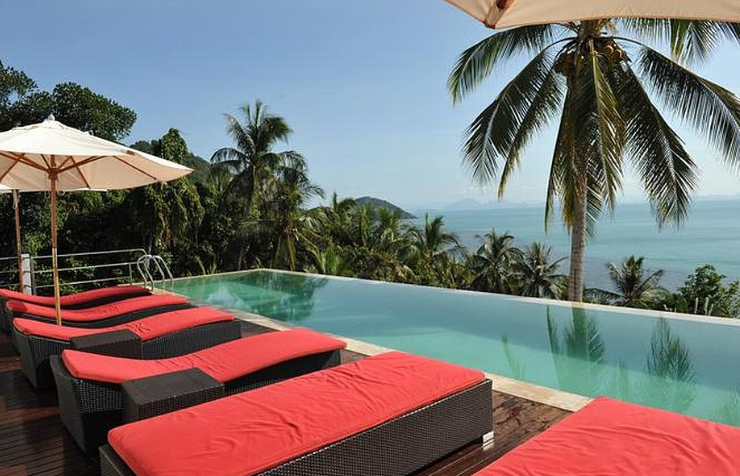
Simplifying Thai Property Laws for Foreign Buyers
Property ownership laws in Thailand often appear daunting to international investors, however understanding these laws is crucial for anyone considering purchasing property in the country. In this guide, we'll explore the dos and don'ts, and discuss alternative ownership structures available to foreigners in Thailand.
The Legality of Foreign Property Ownership in Thailand
The burning question for many international buyers is: Can foreigners buy property in Thailand? The answer is a definitive yes, with certain limitations. Foreigners are permitted to own condominiums but are restricted from outright land ownership, including villas or townhouses. The Thai property laws specify that foreigners can't own land entirely but can have their names on the title deeds for structures and buildings located on the land.
Foreign property ownership in Thailand adheres to three key rules:
- Condo Ownership: Foreigners can own condominiums outright.
- Land Ownership: Complete ownership of land is prohibited for foreigners, but they can own structures and buildings situated on land.
- Alternative Structures: While direct ownership of land is off-limits, alternative ownership structures allow foreigners to indirectly control land usage.
Exploring Ownership Alternatives
Leasehold Purchase
One option for foreigners is acquiring land on a leasehold basis. A leasehold agreement serves as a practical choice for foreign investors seeking to acquire property in Thailand. Under this arrangement, the investor enters into a lease agreement with the landowner, granting them exclusive usage rights for a specified duration. In Thailand, lease periods typically extend up to 30 years, some with the opportunity for two subsequent renewals, with a potential lease period of up to 90 years.
While leasehold arrangements do not give full ownership rights, they afford lessees considerable autonomy and control over the property during the lease term. This includes the freedom to utilise, improve, and even sublease the property within the bounds of the lease agreement.
Additionally, leasehold arrangements eliminate some of the difficulties associated with full ownership, such as land title transfer taxes and regulatory constraints. However, it's essential for foreign investors to seek thorough legal advice to ensure that the terms of the lease agreement are favourable and comply with Thai property laws.
Property acquisition through a Thai company
Establishing a Thai company presents a tactical approach for foreign investors seeking full ownership of a property or land in Thailand. By setting up a Thai company, foreign investors can effectively navigate around the restrictions on direct land ownership, as the company assumes ownership of the property on behalf of its shareholders.
Thai Shareholders
This approach operates within a legal grey area and is not officially endorsed by Thai authorities, but it offers a viable solution for investors seeking to influence land use. To establish a Thai company, foreign investors must adhere to regulatory requirements, including the minimum shareholding threshold of 51% held by Thai nationals. This ensures compliance with Thai laws and mitigates the risk of legal complications.
Investors should engage legal professionals well-versed in Thai corporate law and ensure adherence to regulatory guidelines. While owning a Thai company provides full ownership rights, investors should carefully evaluate the associated risks before pursuing this option.

Legal Obligations
Once a Thai company is set up for property ownership, certain legal obligations must be fulfilled to maintain compliance with Thai regulations. It's essential to prominently display the company's name outside the property to signify ownership and comply with Thai laws. Showing that the property is operated as a legitimate business is imperative, as immigration authorities may conduct checks and documentation, including photographs may be taken by legal representatives for immigration purposes.
Fees
There are fees for setting up the company, which can vary based on factors such as the nature of the business and the number of employees. Furthermore, it's crucial to have a Thai shareholder holding the majority share of at least 51%, as per legal requirements.
Additionally, employing Thai staff is mandatory, and evidence of their employment, including work permits, must be provided. If the shareholder is also employed, they must hold a work permit, and the majority of shares may be transferred to a legal representative while ensuring the continued employment and registration of the Thai staff with the company. These measures are essential to ensure full compliance with Thai laws and regulations regarding property ownership by foreigners.
Residential and Commercial Land Acquisition
Foreigners seeking land for residential purposes in Thailand are subject to specific regulations outlined in the Ministerial Regulation. According to these regulations, foreign investors must meet minimum investment thresholds.
Additionally, there are size limitations imposed on residential land acquisitions, with the maximum land size restricted to one rai, equivalent to approximately 1600 square meters. To ensure compliance with these regulations, foreign investors must submit land acquisition applications to the relevant authorities, such as the Ministry of Interior, and obtain approval from the Minister.
Moreover, commercial land acquisition by foreigners involves a distinct approval process overseen by entities like the Thailand Board of Investment (BOI). The BOI evaluates investment proposals and grants approval for land acquisition based on criteria such as the nature of the business, potential economic benefits, and adherence to investment promotion policies.

Condos vs. Land Property: Which Is Better for Foreign Buyers?
The decision between condos and landed property depends on individual preferences and investment goals.
Land property such as a villa or house, offers greater control and potential value but may come with more restrictions and complexities. Condos provide simplicity, flexibility, and additional support services, making them appealing for various foreign buyers seeking a hassle-free investment with amenities and convenience.
Condos also offer potential rental income and are typically located in prime urban or resort areas. Ultimately, the decision depends on individual preferences, lifestyle considerations, and investment goals, with both options offering unique benefits in Thailand's dynamic real estate market.

Leasehold Purchase
One option for foreigners is acquiring land on a leasehold basis. A leasehold agreement serves as a practical choice for foreign investors seeking to acquire property in Thailand. Under this arrangement, the investor enters into a lease agreement with the landowner, granting them exclusive usage rights for a specified duration. In Thailand, lease periods typically extend up to 30 years, some with the opportunity for two subsequent renewals, with a potential lease period of up to 90 years.
While leasehold arrangements do not give full ownership rights, they afford lessees considerable autonomy and control over the property during the lease term. This includes the freedom to utilise, improve, and even sublease the property within the bounds of the lease agreement.
Additionally, leasehold arrangements eliminate some of the difficulties associated with full ownership, such as land title transfer taxes and regulatory constraints. However, it's essential for foreign investors to seek thorough legal advice to ensure that the terms of the lease agreement are favourable and comply with Thai property laws.
Property acquisition through a Thai company
Establishing a Thai company presents a tactical approach for foreign investors seeking full ownership of a property or land in Thailand. By setting up a Thai company, foreign investors can effectively navigate around the restrictions on direct land ownership, as the company assumes ownership of the property on behalf of its shareholders.
Thai Shareholders
This approach operates within a legal grey area and is not officially endorsed by Thai authorities, but it offers a viable solution for investors seeking to influence land use. To establish a Thai company, foreign investors must adhere to regulatory requirements, including the minimum shareholding threshold of 51% held by Thai nationals. This ensures compliance with Thai laws and mitigates the risk of legal complications.
Investors should engage legal professionals well-versed in Thai corporate law and ensure adherence to regulatory guidelines. While owning a Thai company provides full ownership rights, investors should carefully evaluate the associated risks before pursuing this option.

Legal Obligations
Once a Thai company is set up for property ownership, certain legal obligations must be fulfilled to maintain compliance with Thai regulations. It's essential to prominently display the company's name outside the property to signify ownership and comply with Thai laws. Showing that the property is operated as a legitimate business is imperative, as immigration authorities may conduct checks and documentation, including photographs may be taken by legal representatives for immigration purposes.
Fees
There are fees for setting up the company, which can vary based on factors such as the nature of the business and the number of employees. Furthermore, it's crucial to have a Thai shareholder holding the majority share of at least 51%, as per legal requirements.
Additionally, employing Thai staff is mandatory, and evidence of their employment, including work permits, must be provided. If the shareholder is also employed, they must hold a work permit, and the majority of shares may be transferred to a legal representative while ensuring the continued employment and registration of the Thai staff with the company. These measures are essential to ensure full compliance with Thai laws and regulations regarding property ownership by foreigners.
Residential and Commercial Land Acquisition
Foreigners seeking land for residential purposes in Thailand are subject to specific regulations outlined in the Ministerial Regulation. According to these regulations, foreign investors must meet minimum investment thresholds.
Additionally, there are size limitations imposed on residential land acquisitions, with the maximum land size restricted to one rai, equivalent to approximately 1600 square meters. To ensure compliance with these regulations, foreign investors must submit land acquisition applications to the relevant authorities, such as the Ministry of Interior, and obtain approval from the Minister.
Moreover, commercial land acquisition by foreigners involves a distinct approval process overseen by entities like the Thailand Board of Investment (BOI). The BOI evaluates investment proposals and grants approval for land acquisition based on criteria such as the nature of the business, potential economic benefits, and adherence to investment promotion policies.

Condos vs. Land Property: Which Is Better for Foreign Buyers?
The decision between condos and landed property depends on individual preferences and investment goals.
Land property such as a villa or house, offers greater control and potential value but may come with more restrictions and complexities. Condos provide simplicity, flexibility, and additional support services, making them appealing for various foreign buyers seeking a hassle-free investment with amenities and convenience.
Condos also offer potential rental income and are typically located in prime urban or resort areas. Ultimately, the decision depends on individual preferences, lifestyle considerations, and investment goals, with both options offering unique benefits in Thailand's dynamic real estate market.

Conclusion: Navigating Property Ownership in Thailand
Navigating the complexities of property ownership in Thailand as a foreigner may seem daunting at first glance, but with careful consideration and adherence to regulations, the process can be streamlined and successful.
While Thai property laws may appear complex, a clear understanding of the rules and regulations can pave the way for a smooth acquisition process. Whether investors opt for condominium ownership, leasehold arrangements, or a Thai-company, being well-informed is paramount to making sound investment decisions.
With the right approach, investing in Thailand's vibrant real estate market can be a rewarding venture, offering opportunities for capital appreciation, rental income, and lifestyle enhancement.
Kalara Properties: Your Trusted Real Estate Professionals in Koh Samui
Discover the charm of Koh Samui's real estate market with Kalara, your trusted partner in property ownership with over 20 years of experience and a portfolio boasting 11 stunning property developments of our own. Kalara stands as a beacon of excellence in the industry.
Whether you're seeking to own a piece of Koh Samui's breathtaking landscape or seeking a lucrative rental opportunity, our expert team is dedicated to guiding you every step of the way.
From luxurious villas to elegant condominiums, Kalara offers a diverse range of properties for sale or rent, catering to every lifestyle and budget.

Your Thoughts Matter!
Have you considered purchasing property in Thailand? What are your thoughts on the regulations and alternatives discussed? Get in touch with our professional team today to discuss your options of owning a property in Thailand.





